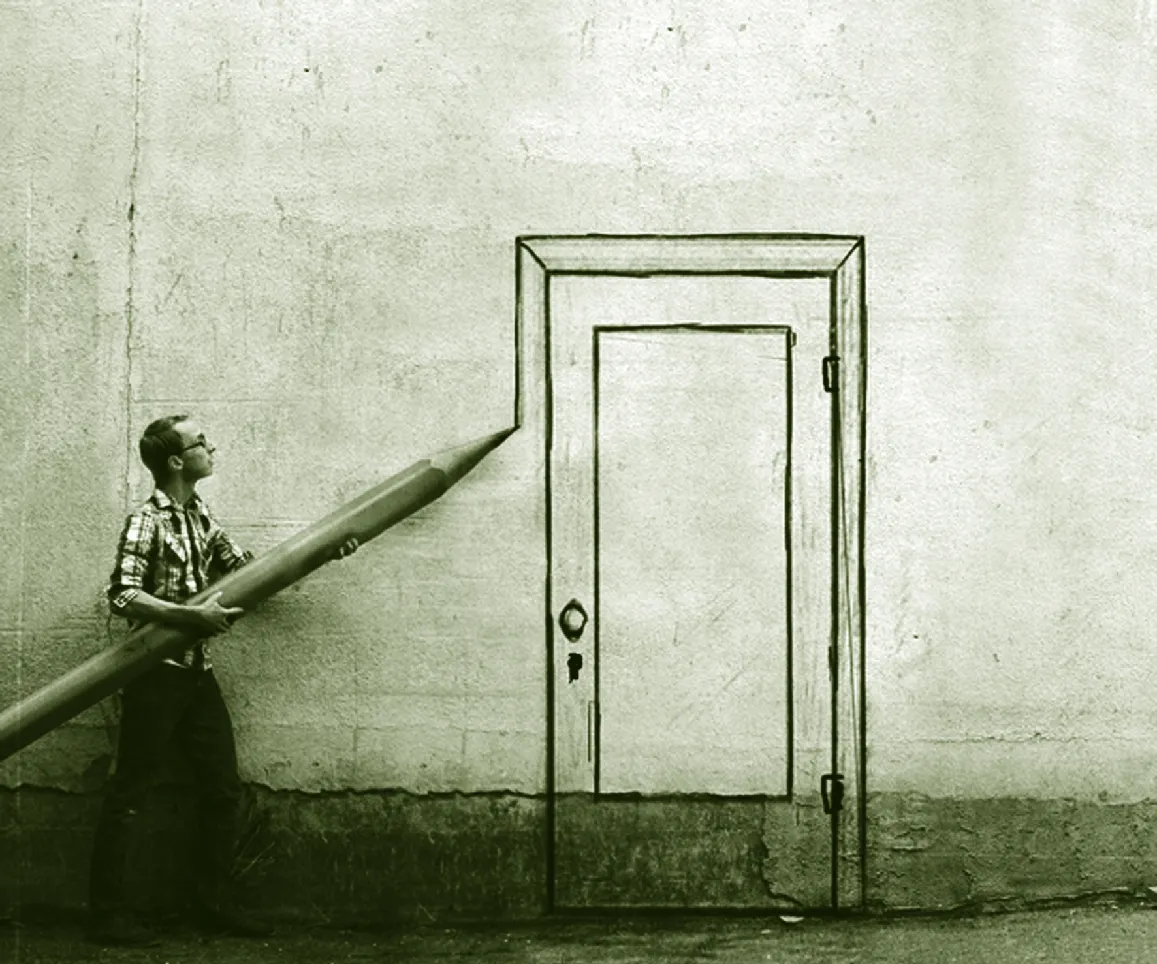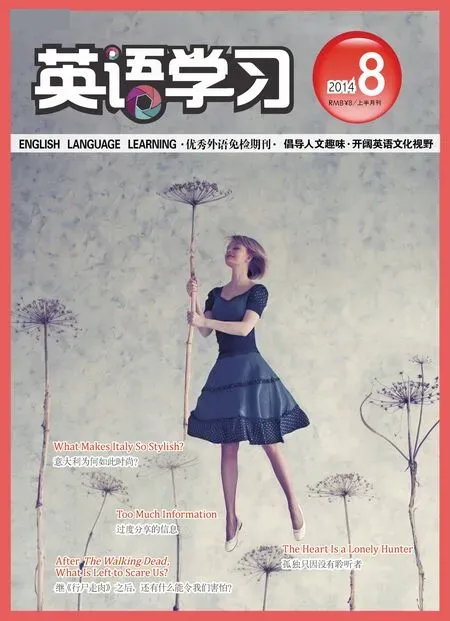The Perfect Holiday
2014-12-17Lucas
E.V. Lucas
∷陈榕 译
Great men are few in any case, and we are so much too apt to look for them in the wrong places—in Parliament for example—that we are in danger of missing some of those that do exist.Not only did I find a great man, but I discovered a great secret too. I discovered how to spend a holiday.
The secret is that our holidays should rest not only our minds and bodies but our characters too. Take, for example, a good man. His goodness wants a holiday as much as his poor weary head or his exhausted body. I wonder if he should not rest it by becoming for three weeks a bad man... Similarly a wicked man should rest his wickedness and devote his month at Brighton to good works.
I do not, I must confess, see, in England, any period of prosperity for my plan; but it is sound, none the less.Perhaps the nearest practicable advice to it that one dares to give is that on a holiday we should endeavor to change the conditions of our life in every way as completely as possible. Only thus can a holiday be,for those of us who are active and restless in mind, a genuine rest. For it is not idleness that such require, but a change of employment.
For myself, who am neither good nor bad, and therefore have neither goodness nor badness to rest, the best holiday would be some occupation in the open air of an exciting or continually engrossing character, as utterly opposed to the ordinary routine of driving a pen as could be devised. And I think I have found it. I believe that a perfect holiday would be to join a traveling circus for a week or so as a utility man.
This discovery came upon me in a flash at Southampton as I watched the performance.During one turn—it was that hoary barebacked jockey act in which the rider sits on the horse’s tail and rocks his arms, and of which I tired permanently thirty years ago—I read in the programme the announcement of the circus’s immediate intentions, and it was then that the desirability of such a life made itself felt—desirability at any rate to a weary literary hack who wished to forget himself and his trade in a certain absorbing Bohemian strenuousness. For on the next day there were to be two performances and a grand procession at Winchester; and the next day at Basingstoke; and the next day at Farnham,and so forth—always the two performances and always (weather permitting) the grand procession of triumphal cars through the principal streets at noon.

What a life! Everything in it but sleep, so far as I can see. Popularity, applause, lamps, might and muscle; the contiguity of wild beasts; tigers, tigers, burning bright in the watches of the night; acquaintance with clowns;proximity to dazzling equestriennes—all inspiring reverence and wonder in small boys. What a life! And wages, too, honestly earned, and perhaps now and then some food and drink. Perhaps a word from Lord John himself: not necessarily friendly, but a word from a lord.
So I felt as I read the programme, quite content to be just a menial hand. But then came the great man, Pimpo,and I saw that I must aim higher.
I may say at once that Pimpo was the busiest clown I have ever seen, and the most versatile. The ordinary clown, it is true, may now and then be detected by the observant—and all of us are observant in a circus—within the clothes of the ring-master, or among the gentlemen who stand at the entrance with white gloves and applaud the ladies; while his appearance, devoid of humor, among the troupe of acrobats who leap over elephants, is not uncommon. But Pimpo never divested himself of his character as a laughter maker, whatever his role might be. And he had more roles than I can remember. We saw him first as a clown and a clown only, winning bottles of wine from the ring-master by a series of adroit sophisms. He was then, as I say, a clown only: a good one, it is true, but no more. He came next with a tea-tray and essayed to loop the loop on it, on this occasion proving himself to be a finished acrobat.A troupe of jumping dogs soon after entered; and who should be their trainer and exhibitor but Pimpo? Later came the great attraction of the evening, if the size of type on the bills is an indication: a “Horde of Forestbred Siberian Bears.” In strolled the horde, very tame and mild, three in number, and sat at a desk and drank milk from a bottle and rode on a toy roundabout—all under the direction of whom? Pimpo. (There is no doubt about his name, for it was on his back.)
Here was versatility enough, one would think: but Pimpo had other views. Only a few minutes passed before he was again in our midst as a wire-walker, doing things in mid-air that I could not do on the ground and putting to shame his three companions, who performed as it were on crutches beside him. And then a final entry, as impresario to a couple of elephants whose special talent was shaving each other and extinguishing a house on fire. That was an evening’s work of some magnitude alone: but Pimpo did not merely put his various beasts through their tricks and nothing else:he jested incessantly until the little boys’ laughter was as steadily recurrent as the roar of the surge; he tumbled; and once, threatening to fight the ring-master, he took off twenty waistcoats.
The elephants gone, and the burning house extinguished,the circus men began to tear up the seats, and loosen the tentropes, and prepare for the march on Winchester. I waited a little to watch them, and then turned away towards my inn.As I did so I caught sight of a sturdy fellow with a chalked face carrying a truss of hay towards the elephants’ tent. It was Pimpo, beginning his night’s work.
“There,” I said to myself, “goes a great man. It is he I would be for a fortnight——that would be a holiday indeed.”


伟人总是少数,而我们在寻找他们的时候,往往容易找错地方——比如到议会里去找,结果反而可能会错过那些真正伟大的人。我曾经发现过一位伟大的人,而且还发现了一个伟大的秘密。我发现了应该如何度过假期的秘诀。
秘诀是假期应该既能让人放松身心,也能让人改换禀性。以一个好人为例。他的美德就像他可怜的、萎顿的大脑或者是筋疲力尽的身体一样需要休假。我在想他难道不该给美德放个假吗,当三个星期的恶人…… 同理,坏蛋应该放弃作恶,利用在布莱顿的这个月行善积德。
实话实说,我知道在英国,这样的计划什么时候都行不通。不过,这计划是合理的。或许最实用的建议是我们在休假时,应该尽可能地彻底改变生活环境。对我们这些大脑一刻不停地飞转的人来说,只有这样的假期才是真正的休息。休息需要的不是无所事事的懒散,而是换个职业。
E. V. 卢卡斯(1868—1938)出生于伦敦一个教友派家庭,16岁在书店当学徒,自学成才,成为新闻记者,后担任英国著名幽默杂志《潘趣》(Punch)的编辑。卢卡斯的艺术创作跨越诸多领域,曾经写过戏剧、诗歌、小说,也曾经因出版查尔斯·兰姆的传记而蜚声文坛。然而,总体而言,他的作品以散文的成就最大。他的散文笔触从容,富有想象力,语言诙谐幽默,其中代表作有《性格与喜剧》(Character and Comedy, 1907)、《付出与收获》(Giving and Receiving, 1922)、《漫步者的奖赏》(Saunterer’s Rewards, 1933)等。
我算不上好人,也不是坏蛋,因此不需要给什么美德或者邪恶放个假。对于我来说,最好的假日就是呆在户外,做点让人兴高采烈或者是忘乎所以的事,相对于日复一日地耍笔杆,这是我所能想到的最为不同的选择。我想我已经知道了该干什么。我相信完美的假期就是成为马戏团的一员,干上一个星期左右,当个万能的配角。
我是在南安普顿看表演时,灵机一动想到这个主意的。在观看某轮节目时——节目表演的是传统的无鞍骑术,骑手坐在马尾部,挥舞着胳膊,这种节目30年前我就看腻了——我在节目单上读到了马戏团目前的行程安排,就在那一刻,我体会到了这种生活的吸引力——这种生活绝对合乎疲惫文人的心意,可以让人忘却自我,忘却工作,投身到精彩的、火热的、波西米亚式的生活中。第二天,在温切斯特有两场表演和一场大游行;一天后在巴星斯多克;再过一天,在法汉姆,诸如此类——惯例是两场表演,惯例(只要天气允许)是在午间的主干道上进行花车巡游。
多精彩的生活啊!照我看,除了睡觉,应有尽有。人们的热烈追捧、掌声、石脑油灯、力量与肌肉;川流不息的野兽;老虎,老虎,在夜晚人们的注视中熠熠生辉;结识小丑;接近散发无穷魅力的女骑手——这正是小男孩们梦寐以求的荣耀和精彩。多棒的人生!还有依靠诚实劳动换来的薪水,或许时不时还有食物和饮料。也许还能听到约翰爵士本人的发言:口气不需要多亲切,只要是爵士说了话就行。
所以,我看着节目单,志得意满地盘算着要去当个小配角。可是平泼这个伟大的人物出场了,我这才恍悟需要把目标订得更高一点。
我敢说在我见过的所有小丑中,平泼是最忙碌的,也是最多才多艺的。说真话,普通的小丑要是你目光敏锐,有时是能够辨认出来的——在看马戏的时候,我们个个目光敏锐——他可能穿着马戏团领班的衣服,也可能站在入口处的绅士堆里,带着白手套为女士们鼓掌;如果他放弃搞笑,出现在杂技演员的行列里,从大象头顶凌空飞过,这也没什么稀奇。而平泼无论扮演什么角色,却从未忘记自己是个要让人欢笑的角色。他的角色多得我都记不住。我们起先发现他是个小丑,纯粹的小丑,用一连串机敏的俏皮话从马戏团领班手里赢了一瓶又一瓶的葡萄酒;照我说,他当时只是个小丑:绝对是个好小丑,但仅此而已。接着,他带着茶盘上场了,试图托着茶盘翻跟头,用这个机会证明了自己是个出色的体操家。随后,一大群狗蹦蹦跳跳地上场了;谁是驯兽师和表演者?当然是平泼。接着是当晚的最大看点,光看节目单上的字号就能猜出来:“森林野生西伯利亚熊群”。这些熊踱着步上了场,表现得又听话又温顺。一共三只熊,坐在桌子旁边,从瓶子里喝牛奶,乘坐玩具旋转木马——这一切都是谁在指挥?平泼。(这必定是他的名字,因为就写在他背上。)
人们会想:这已经足够多才多艺了吧。平泼可不这么想。几分钟后,他又出现在我们中间,这次是走钢丝的人。他在半空中的表演我在平地上都做不了,三个同伴和他一比顿时黯然失色,他们在他身边看起来就像是拄着拐杖的残疾人。而他最后一次上场时,指挥着两只大象,大象的才艺是相互剃毛,以及给一座着火的房子灭火。一晚上光是忙这些就足够了:然而,平泼可不是只让各式各样的动物完成表演就行了:他不停地插科打诨,让小男孩们的笑声一浪高似一浪;他突然摔倒;还有一次,他威胁要和马戏团领班打架,一口气脱下了20件马甲。
大象下场了,着火的房子熄灭了,马戏团的人们开始拆卸座椅,松开蓬绳,为温切斯特的游行做准备。我望着他们,等了一会儿,然后转身向我住的酒店走去。正在此时,我看到了一位脸上涂着白粉的健硕男子拿着一大捆干草走向大象的帐篷。他是平泼,开始了晚上的工作。
“那才是个伟大的人。”我对自己说。“我想当两个星期的他——那才是真正的假期。”
